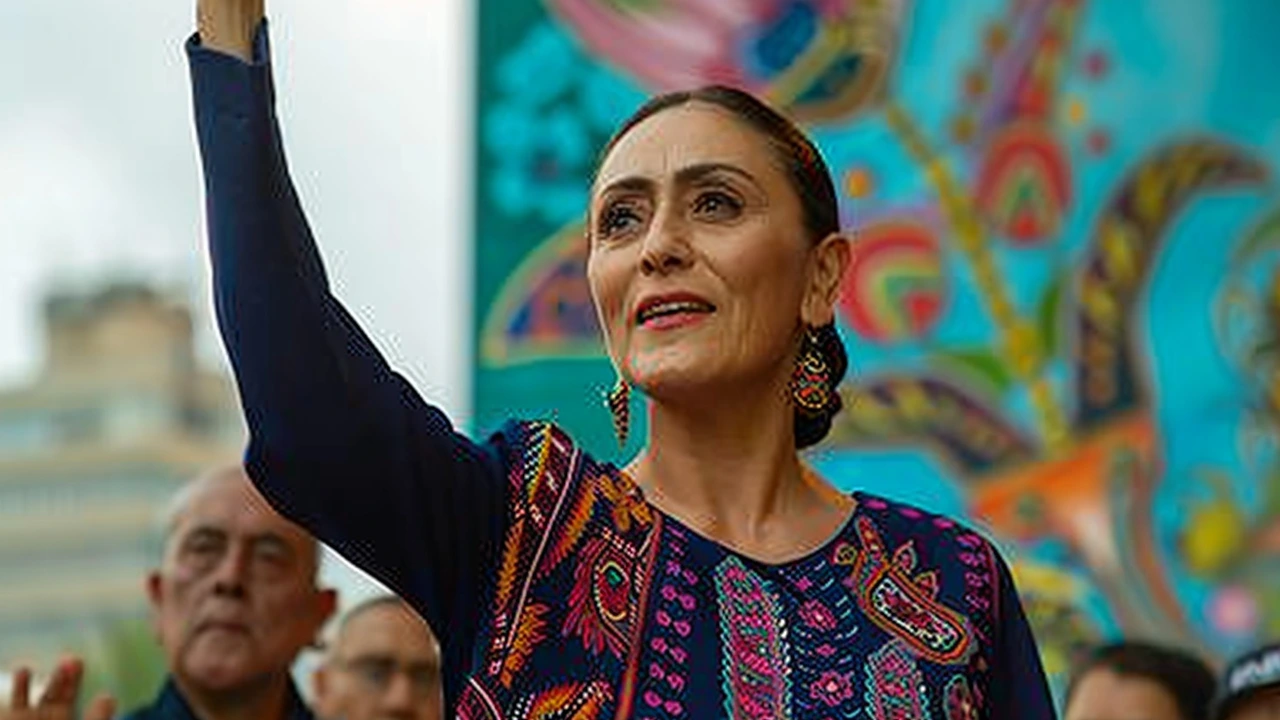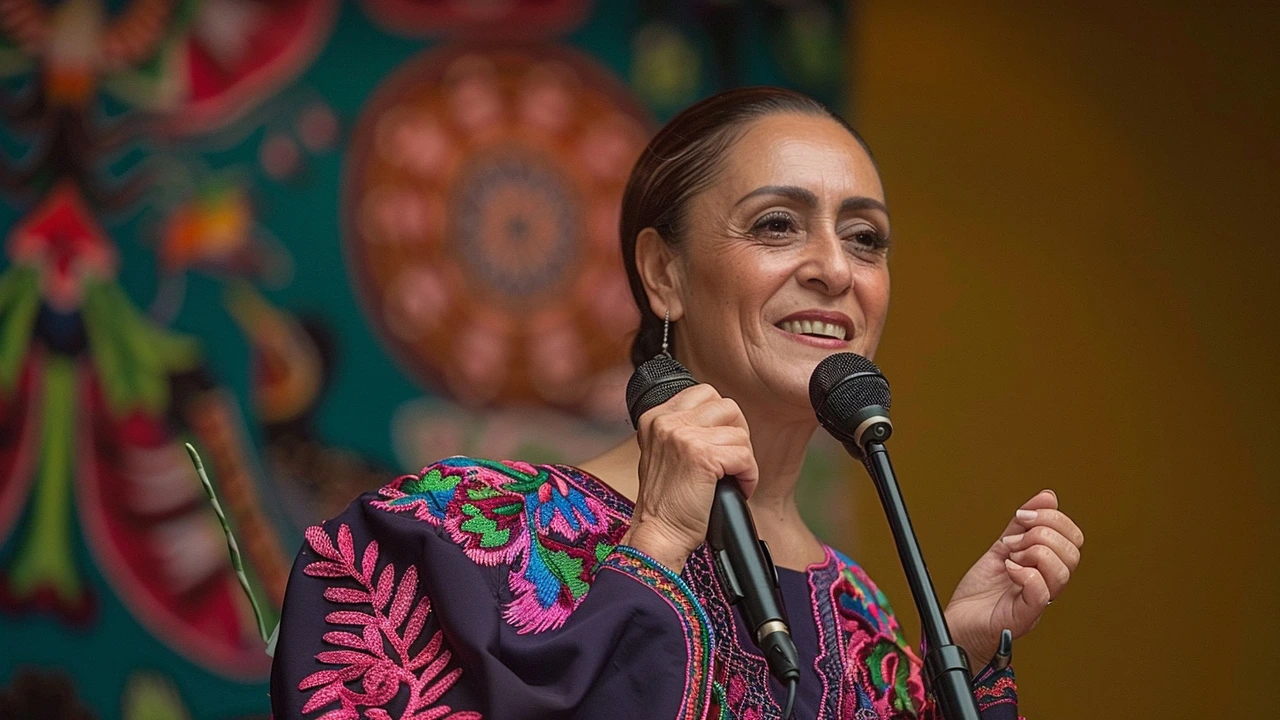Introduction: A Green Shift in Mexican Politics
In a landmark event, Mexico has elected Claudia Sheinbaum as its new president, making her the country's first climate scientist to hold this position. As an energy engineer and a noted contributor to the Intergovernmental Panel on Climate Change (IPCC), Sheinbaum's election introduces a compelling chapter in the interplay between politics and environmental stewardship in one of the world's largest economies. Her tenure will begin on December 1, commanding attention from both national and international observers.
Campaign Promises: A Bold Vision for Clean Energy
During her campaign, Sheinbaum articulated an ambitious vision to revolutionize Mexico's approach to energy and environmental sustainability. She pledged a significant $14 billion investment in clean energy initiatives, a commitment aimed at reducing Mexico’s reliance on fossil fuels. Complementing this, she promised to enhance the country’s public transportation system by increasing the number of electric buses and trains, a move designed to reduce urban pollution and promote green mobility.
These commitments represent a fundamental shift for Mexico, a country where fossil fuels have traditionally dominated the energy landscape. Despite the promise of such transformation, skepticism looms, particularly given Sheinbaum's close ties with the pro-fossil fuel policies of her predecessor, President Andrés Manuel López Obrador (AMLO).

Skepticism from Experts and Analysts
While Sheinbaum's green agenda has generated optimism, it has also been met with a healthy dose of skepticism. Critics argue that her historical ties to AMLO—known for his staunch support of fossil fuel industries—cast doubt on her ability to fully realize her ambitious climate promises. This skepticism is further fueled by Sheinbaum's previous tenure as mayor of Mexico City. Though she promoted solar power initiatives, her efforts to address the city's severe air pollution were perceived as minimal by environmental activists and experts.
Moreover, Sheinbaum has expressed an ideological preference for maintaining state control over key energy sectors. Her stance against extensive privatization of energy industries raises questions about the practical implementation of her renewable energy plans. Analysts caution that while public mobilization of resources for renewables is commendable, it may not sufficiently meet the demands of Mexico’s commitments under the Paris Agreement.
Potential Challenges and Roadblocks
Sheinbaum’s subsequent government will face considerable challenges in balancing state and private sector roles in Mexico’s energy transition. The country’s entrenched fossil fuel interests are powerful and deeply connected to the national economy. A pivot towards renewable energy may encounter resistance from these sectors, as well as logistical and financial hurdles.
Moreover, transitioning to a cleaner economy requires not just capital but also regulatory frameworks, policy consistency, and technological innovation. Mexico’s current energy infrastructure and regulatory environment may pose difficulties in adapting to the new priorities set forth by Sheinbaum’s administration. Effective collaboration between various stakeholders, including government agencies, private companies, and civil society, will be crucial in navigating these challenges.

Optimism Amidst Uncertainty
Despite the obstacles, there remains a sense of cautious optimism among some experts and environmental advocates. They hope that Sheinbaum will leverage her scientific background and newfound political independence to devise a concrete, actionable plan for cutting Mexico’s carbon emissions and enhancing climate resilience.
Sheinbaum's scientific expertise is seen as a unique asset in understanding and addressing the environmental challenges facing the nation. This background could provide her with the necessary perspective to bridge the gap between scientific imperatives and political feasibility. If she manages to effectively merge her scientific insights with robust policy measures, it could set a precedent for other nations grappling with similar climate challenges.
A Future at Stake
As Sheinbaum prepares to assume office, the expectations and pressures on her leadership are immense. The world will be watching closely to see how she navigates the dichotomy between political realities and the urgent need for climate action. Her success or failure could significantly influence Mexico’s environmental trajectory and its role in the global fight against climate change.
One thing is clear: Claudia Sheinbaum’s presidency marks a pivotal moment for Mexico. It brings the promise of a greener future but also highlights the complex interplay between scientific ideals and political pragmatism. Her journey will be a testament to the capacity of leadership to effect meaningful change in the face of formidable challenges.

Conclusion: A New Era for Mexico
Claudia Sheinbaum’s ascent to the presidency heralds a new era for Mexico, one where climate science and political ambition intersect. Whether she will successfully navigate this complex landscape remains to be seen. Nonetheless, her election undoubtedly marks a significant step forward in the global narrative of climate leadership. As Sheinbaum steps into this role, her actions will be keenly observed, not just by the people of Mexico, but by an international community increasingly invested in the global climate agenda.







Posts Comments
रमेश कुमार सिंह June 4, 2024 AT 17:22
Imagine a president who actually reads peer-reviewed papers before signing bills-mind blown. Sheinbaum’s not just waving green flags, she’s designing the whole damn solar-powered parliament. The fact that she helped draft IPCC reports means she’s not talking about climate change like it’s a trending hashtag. This is someone who’s seen the data, felt the weight of it, and still chose to run for office. That’s not politics. That’s courage wrapped in a lab coat.
Yeah, AMLO’s shadow is long, but she’s not him. She’s the scientist who watched him fund oil rigs and quietly kept building solar microgrids in Mexico City’s poorest barrios. That’s not hypocrisy-that’s strategy. She knew she couldn’t win by burning bridges. Now she’s got the keys. Time to turn the ignition.
People say ‘state control’ means inefficiency. But look at Norway’s oil-to-renewables pivot-state-led, not privatized. Sheinbaum’s not against markets, she’s against letting Exxon write Mexico’s energy policy. And honestly? If you’ve ever tried to get a private company to install EV chargers in Oaxaca, you’d get it.
Let’s not romanticize this. The roadblocks are real. Fossil lobbies, crumbling grids, corruption. But she’s got something no other Mexican leader has: the ability to translate gigatons into policy. That’s rare. And frankly? We need more of that.
Krishna A June 5, 2024 AT 21:22
Sheinbaum is a CIA plant. They put her there to make Mexico look green so we stop caring about the real issue-US drones over Chiapas. Also, electric buses? Where’s the lithium coming from? Bolivia? That’s just colonialism with a solar panel.
Jaya Savannah June 7, 2024 AT 11:10
so she’s a scientist… cool? 😅 but like… did she also fix the potholes? 🤔 also i saw a video of her eating tacos with a fork. is this the new normal? 🤡
Sandhya Agrawal June 7, 2024 AT 20:37
They’re watching her. Every move. Every speech. Every time she smiles at a fossil fuel exec. I’ve seen the pattern. First they give you the title. Then they give you the budget. Then they make you sign the contract that lets them keep drilling. Sheinbaum’s not naive-she’s playing 4D chess. But I’ve seen this movie before. The green president always ends up in a black SUV with tinted windows. I’m not saying she’s compromised. I’m saying the system already won.
And don’t get me started on the electric buses. Who’s maintaining them? Who’s training the drivers? Who’s paying for the batteries when they die? No one talks about the trash. No one ever talks about the trash.
Vikas Yadav June 9, 2024 AT 08:37
It’s important to note, however, that while Sheinbaum’s scientific background is undeniably valuable, the transition from academic expertise to executive leadership is not guaranteed to yield immediate results-especially in a country with deeply entrenched institutional inertia, where bureaucratic resistance often outweighs political will, and where public trust in state institutions remains fragile, despite recent reforms.
That said, the symbolic weight of her election cannot be overstated: a woman, a scientist, and a Jew in a nation where these identities have historically been marginalized in the highest echelons of power-this is not just policy, it’s a cultural reckoning.
And while critics rightly point to her ties to AMLO, it’s worth remembering that even the most compromised leaders can, under pressure, pivot-especially when the science is as clear as it is now, and when the public, especially youth, are watching with unprecedented vigilance.
Amar Yasser June 11, 2024 AT 05:38
bro she’s literally the first president who didn’t major in law or business. that’s wild. imagine a leader who actually knows what a carbon footprint is instead of just saying ‘we love the environment’ at rallies. i’m not saying she’ll fix everything, but at least now we’re not just yelling at the sky anymore. let’s give her a shot. the planet needs this.
Steven Gill June 13, 2024 AT 05:10
It’s funny… I used to think climate policy was about tech and money. But watching Sheinbaum’s campaign, I realized it’s about trust. People don’t need more solar panels-they need to believe someone won’t sell them out. Her science credentials don’t guarantee success, but they do mean she’s not lying when she says ‘this is urgent.’
I grew up in a town where the oil refinery was the only employer. I get why people fear change. But when your kid has asthma because of the smog… you start listening to scientists. Maybe that’s her real power-not the $14 billion, but the quiet way she makes people feel heard before she asks them to change.
She’s not going to fix Mexico’s grid overnight. But if she can make one small town believe the future’s worth fighting for… that’s how revolutions start.
Write a comment